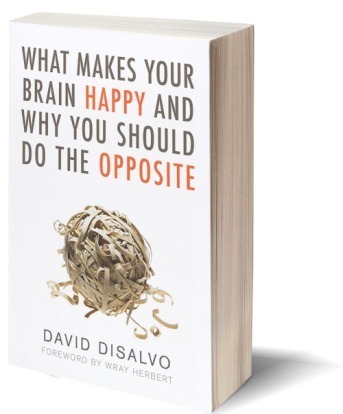Posts Tagged ‘cognitive-science’
The Business and Ethics of the Brain Fitness Boom — Part 4: The Future
This is the last part pf The Business and Ethics of the Brain Fitness Boom series
Read MoreThe Business and Ethics of the Brain Fitness Boom — Part 3: The Real Need
This is part 3 of the 4‑part The Business and Ethics of the Brain Fitness Boom series.
Read MoreWhat makes your brain happy and why you should do the opposite
(Editor’s Note: This is an excerpt from David DiSalvo’s new book What makes your brain happy and why you should do the opposite.) Taking a position in any argument—large or small—is slippery business for our brains. We can have every intention of honestly pursuing an answer, yet still fool ourselves into thinking our method is…
Read MoreMichael Merzenich on Brain Training, Assessments, and Personal Brain Trainers
Interview with Dr. Michael Merzenich, Emeritus Professor at UCSF, a leading pioneer in brain plasticity research. In the late 1980s, Dr. Merzenich was on the team that invented the cochlear implant. In 1996, he was the founding CEO of Scientific Learning Corporation (Nasdaq: SCIL), and in 2004 became co-founder and Chief Scientific Officer of Posit Science. He was elected to the National Academy of Sciences in 1999 and to the Institute of Medicine this year. He retired as Francis A. Sooy Professor and Co-Director of the Keck Center for Integrative Neuroscience at the University of California at San Francisco in 2007. You may have learned about his work in one of PBS TV specials, multiple media appearances, or neuroplasticity-related books.
Read MoreBrain Fitness at New York Public Library, next week
Title: The SharpBrains Guide to Brain Fitness — Practical Advice to Keep Your Brain Sharp — Two community-based book talks hosted by New York Public Library and supported by the Einstein Aging Study at Albert Einstein College of Medicine. Description: A fit brain? Can you exercise your brain and become mentally fit? Can you continue to…
Read MoreReferences on Cognitive Health/ Brain Fitness
This is a partial list of the literature we reviewed during the research phase of our new book, The SharpBrains Guide to Brain Fitness. We know many friends of SharpBrains are researchers, healthcare professionals, graduate/ Ph.D. students, who want have direct access to the references (perhaps PubMed should promote itself as a never ending source…
Read More


